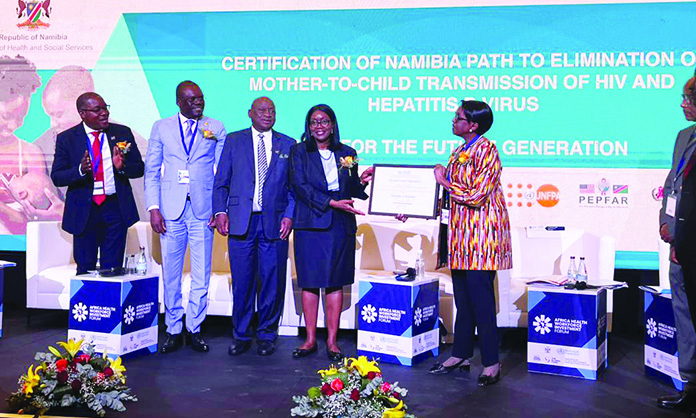… alcohol and drug abuse red-flagged at schools
A new report by a parliamentary standing committee has pinpointed the chief factor behind the high failure rate of grades 11 and 12 pupils in the 2022 academic year: the automatic progression of students to the next grade without learning basic competencies like reading and writing.
The report, presented by the standing committee on education, science, information and communication technology, and youth development during yesterday’s National Council session, highlighted that certain students in grades 11 and 12 had not acquired fundamental competencies like reading, yet advanced through the grades via an automatic transfer system.
“The committee established through the various hearings and focused discussions it had with stakeholders, that the automatic promotion policy contributed to pupils performing poorly, as they were being moved through from pre-primary to Grade 7 lacking competencies and the ability to read or write, and this presented a challenge at the secondary level,” committee chairperson Olivia Hanghuwo said.
The committee said this situation has led to a foundational knowledge gap schools are struggling to address, given the multitude of other challenges, such as financial, human resources, and infrastructure issues, among others.
The committee discovered that over 75% of the Grade 11 pupils at Gibeon’s Cornelius //Oaseb Secondary School’s class of 2023 had and was always transferred automatically.
Of the remaining 25% who had passed, only a few managed to continue to an advanced level.
At Groenewald Secondary School in the Hardap region only 18 of the 20 pupils in Grade 11 were transferred from primary school.
“The teachers thus claimed that in secondary school, there was simply no time to teach pupils how to read. In addition, teachers were not trained to teach at this level, and as a result, pupils would fall behind.
“It was thus the teachers feeling there should be teachers dedicated and trained for reading only – even at secondary level,” Hanghuwo said.
She said the committee has also found that pupils have identified loopholes in the system to capitalise on.
“The attitude of pupils towards the automatic promotion was said to be of such a nature that they do not bother to work and gain knowledge. They only target reaching Grade 11 and exit the system,” Hanghuwo said.
The committee suggested that the automatic transfer of pupils should end at junior primary level and not be extended to secondary level.
‘REPETITION NOT AN OPTION’
The Ministry of Education, Arts and Culture in response to these concerns says the automatic transfer system came with the revised curriculum, which is a blend of social promotion and grade repetition and is aimed at the early detection of learning difficulties.
Deputy executive director of education, arts and culture Edda Bohn says keeping pupils in the same grade is not an option.
“Repetition is not an option. We cannot keep the pupil in the same grade for years. The system cannot afford repetition,” she says.
Bohn says the ministry encourages a targeted pupil support approach where each one must be assisted in acquiring basic competencies such as reading and writing.
“Targeted pupil support must start at early childhood development and primary level. If the pupil reaches high school without the basic competencies such as reading, then that pupil has been failed already at foundational level,” she says.
Bohn says the automatic transfer system is well developed, however, “we are only facing issues with implementation, but we are working very hard to get it right”.
ALCOHOLISM, HUNGER
The report has identified significant alcohol and drug addiction in schools nationwide, with pupils in some cases stealing items such as taps, light bulbs, and door handles to sustain their addiction.
“It was stressed that rampant ill discipline is a result of alcohol and drug abuse. It was noted that some pupils barely concentrate in class as they would be under the influence of illegal substances,” Hanghuwo said.
She said stakeholders visited by the committee highlighted that alcohol and drug abuse among pupils increased at the height of the Covid-19 pandemic and prevails.
“These are the same pupils society expects to produce good results. School management thus called on the government to pronounce itself on the use of drugs by pupils,” Hanghuwo said.
Poverty was also stressed as one of the major contributing factors to the current state of education in many regions, particularly the Kunene, Kavango West, Kavango East, Hardap, Omaheke, and Zambezi regions.
“It was reported that pupils are starving in the communities, eating only twice or once a day. They go to school on an empty stomach, which affects their concentration,” Hanghuwo said.
Social justice activist Nafimane Hamukoshi says this dynamic often leads to teenage pregnancies and exposes pupils to sexual abuse and increases the risk of contracting sexually transmitted infections.
“To address these challenges, long-term initiatives such as implementing a universal basic income grant can play a crucial role in reducing the prevalence of these issues and alleviating the associated concerns.”
Stay informed with The Namibian – your source for credible journalism. Get in-depth reporting and opinions for
only N$85 a month. Invest in journalism, invest in democracy –
Subscribe Now!






